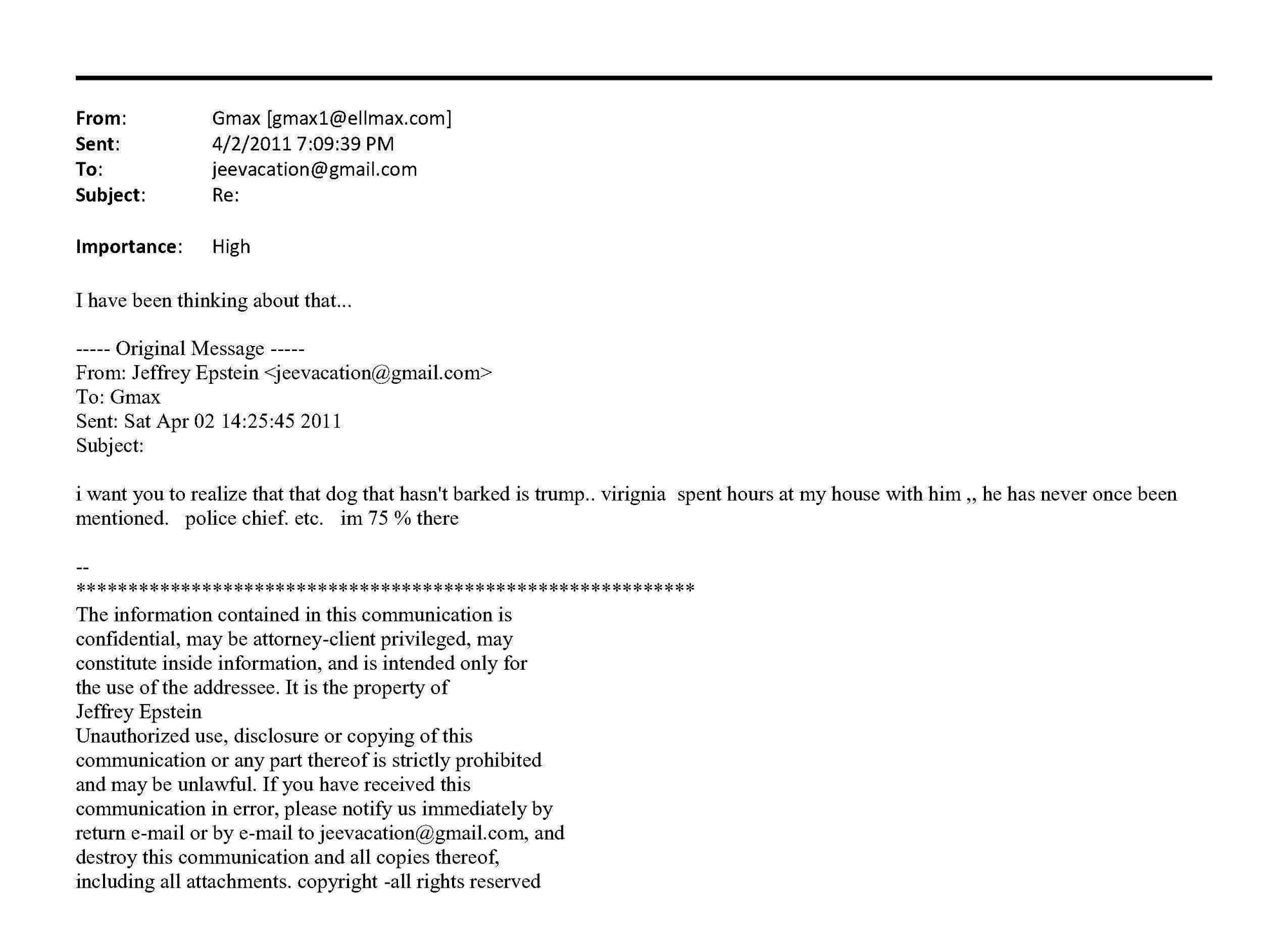Like most of the planet, I’m mesmerised by the unfolding Epstein email cache and its political ramifications. This whole sequence lies somewhere between a soap opera and a detective drama – a sign of our times and perhaps, most importantly, a much-delayed reckoning. It’s engrossing not only because of the nature of today's politics, but also because it’s an extreme example of the often noxious and pernicious gender relations of my generation.
So… the news is that the US Congress this week released a barrage of documents that were recently turned over by Jeffrey Epstein’s estate, including 2,300 email threads that the convicted sex offender either sent or received between 2008 and 2019. They are revealing and embarrassing; all of this has been exhaustively reported and discussed.
The remarkable thing — or at least one remarkable thing — about this whole episode is how an increase in the quantity of public information specifically designed to quell interest in the subject has had exactly the opposite effect. It’s almost funny: every attempt to make the subject go away immediately suggests increased culpability, as US President Donald Trump has learnt to his chagrin.
On November 12, 2025, Democratic members of the House of Representatives Oversight Committee released three emails referencing Trump. Just three. In quick response, on the same day, Republicans released an additional 20,000 pages. Seriously.
Clearly, the Republicans wanted to avoid the Democrats’ strategy of drip-feeding the information in a protracted stream to keep the issue alive. American transparency now resembles a striptease performed by people who desperately hope you’ll avert your eyes.
But the point is that in this huge batch of information, there is one truly fascinating email. This is it:

The email is so interesting because it is so frustratingly difficult to interpret. Why has the metaphorical dog, Trump in this case, not barked? What would he have barked? Who is the “police chief”? And most crucially, what did Epstein mean when he says to his weirdo confidant and hideous fellow 'groomer' Ghislaine Maxwell that he is “75% there”? Where is “there”? When and how does he achieve 100%? Why has Maxwell been “thinking about that”?
Just for fun, and as an exercise in logic and detective work, let’s try to work this out. And just by the way, the punctuation! Here are people who clearly spent too much time around billionaires and not enough time around grammar handbooks.
First, the context matters. The email was sent just after lunch in April 2011, flagged with “high” importance, using two email addresses with concocted descriptions: jeevaction in Epstein’s case (explain that if you will) and gmax (a little bit more logical) in Maxwell’s case. “Virginia” is obviously a reference to Virginia Louise Giuffre (née Roberts), the most prominent of Epstein and Maxwell’s accusers, who was trafficked by the couple between 2000 and 2002 and who killed herself in April of this year. Giuffre testified that she was “passed around like a platter of fruit” to Epstein’s powerful associates, as well as providing massages and sexual services to Epstein himself. Obvs.
There had been legal filings before this, but they were aimed essentially at Epstein, and the “third parties” were not publicly known. It all exploded into the public realm in March 2011, when the Mail on Sunday published a photo showing the person previously known as Prince Andrew and Giuffre in Maxwell’s London home. After visiting a nightclub in 2001, Giuffre says Maxwell told her that she “had to do for Andrew what I do for Jeffrey.” She did. He said he was not sweaty. He was.
So, presumably, in 2011, Epstein and Maxwell had also become sweaty. The house of cards is about to come crashing down on their heads, or might, so they are both hyper-aware of what is happening around them.
The first curiosity is the phrase: “I want you to realize…”. It’s a strange formulation — more an instruction than an explanation. It suggests he thinks that Maxwell may be missing a key point, and that he is claiming special insight. Likely, he’s trying to reassure her that Trump is not (yet) a risk to them, or he is persuading her that Trump’s silence is strategically significant. It’s as if he is saying: “You’re not fully appreciating how important it is that Trump has stayed out of this story.”
What about the phrase “The dog that hasn’t barked is Trump”? The reference is obviously to the Sherlock Holmes story Silver Blaze, in which Holmes noticed that a watchdog didn’t bark during a crime; this demonstrated that the dog knew the culprit. It’s become an idiom. Normally, the reference suggests the absence of an expected reaction that itself becomes a clue. Holmes had a dog that didn’t bark: Epstein had the billionaire who didn’t speak out, which, given the person involved, is legitimately surprising.
Yet in this case, it is ambiguous. It could mean that Giuffre is the metaphorical dog that didn’t “bark”. That's odd, because according to Epstein, she spent “hours” with Trump at his house. In his mind, presumably, the couple did have sex, because that’s what he would have done. So it’s strange to him that Giuffre has not named Trump.
Or ... Trump is the dog since Trump, despite proximity to Epstein, had neither denounced him nor publicly spilt damaging information? This interpretation is linguistically logical since Trump is specifically referenced. And by the way, Epstein assumes silence is guilt, which tells you something about Epstein.
The only problem is that Trump and Epstein fell out in 2004/05 because Epstein tried to outbid Trump on a Palm Beach mansion — the Maison de l’Amitié sale — a bidding war which Trump won. But more importantly, Trump had indeed “barked” in the sense that he publicly announced he had fallen out with Epstein in 2009.
So by 2011, when the email was sent, Trump had (sort of) denounced him, or at least depreciated their previous friendship. What he had not done was denounce Epstein by claiming he was a paedophile and was trafficking young women. Except he had! As far back as 2002, Trump said of Epstein that “he likes beautiful women… and many of them are on the younger side” in an interview with New York Magazine.
Hence, Epstein may be implicitly saying either that the victim hasn’t accused Trump, or that Trump hasn’t turned on us, which in his mind might make Trump a valuable “non-problem”, or even a potential ally. The first reading (Giuffre’s silence about Trump) is supported by Giuffre’s subsequent claims that Trump “couldn’t have been friendlier”. Giuffre never alleged that Trump engaged in sexual misconduct with her or with any trafficking victim.
But if this is the case, how do you square that with the subsequent comment, “Virginia spent hours at my house with him”? The brevity and elliptical nature of the comment are interesting because it has led to diametrically opposed interpretations. For Republicans, the conservative media, and indeed for Trump, the email is portrayed as exculpatory because, as the logic goes, Trump spent hours with Giuffre, but he was never one of the men she accused. Done and dusted.
For Democrats and perhaps others, the comment is not condemnatory but is suggestive. Epstein is at this point speculating about who might “turn” on him and who hasn’t. He is thinking, we suspect, that Trump is, by his standards, rather subdued about the whole affair, suggesting he was definitely “massaged”. Epstein didn’t know that at this point, Giuffre was not going to accuse Trump or exonerate him. He was just pleased to point out to Maxwell that Trump, who had every reason to excoriate Epstein, had not done so, which makes the “I want you to realize…” phrasing make more sense.
What about the “police chief. etc.” comment? This is really hard to fathom. It could be literal, and he was listing other powerful men who had contact with Giuffre. Or it could be generic, almost like saying: even law-enforcement figures who know her or knew us haven’t surfaced as part of the story. Or it could be code for someone with a law-enforcement-style role. Tough.
And finally, the “I’m 75% there” comment. This is maddeningly vague. It could mean he is telling Maxwell: “I’ve almost worked out the full picture of what’s going on / how to handle this.” Or it could refer to negotiations with lawyers, prosecutors, or some authority (possibly including the “police chief” reference), and he is 75% of the way to securing a favourable outcome or arrangement. Or he is reassuring himself about Trump. So he might mean: “I’m about 75% convinced that Trump will stay quiet / loyal / non-threatening given Virginia’s silence and other clues.”
What about Maxwell’s response? I mean, it’s extremely non-specific. “I’ve been thinking about that…” — about what exactly? She is confronted with a complicated set of theories and speculation, and her only response is “I’m thinking about it.” Not very helpful.
But happily, someone could still ask her. She is available in prison — well, now in a much more comfortable prison-like establishment, which is, of course, in itself suspicious. Why is that happening? We would like to know.
If the disclosure of these emails achieves anything, it is to affirm a simple truth: that the world is not governed by paragons of strategic brilliance but by fallible people whose confidence exceeds their competence. This is not reassuring, but it is clarifying.
For paying customers, I’ll hazard a guess about what I think the email actually means. Subscribing costs a mere $2 a month, which is peanuts. Literally. A 20-oz pack of Great Value salted and roasted in-shell peanuts will set you back $2.08. And Loose Canon is not fattening. Bargain!
